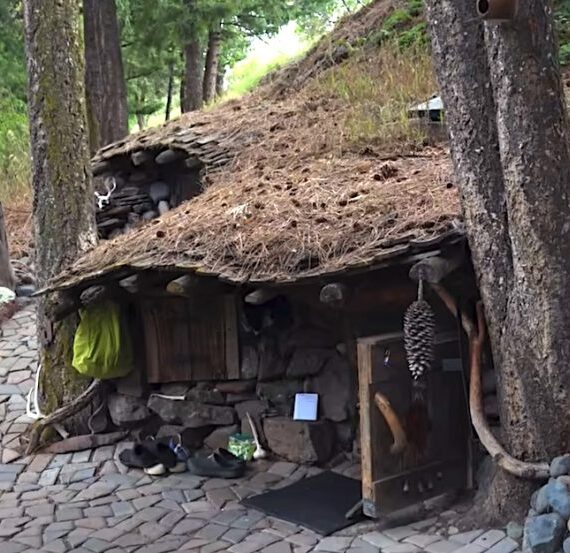I’m Alex.I’ll be honest Simple Living is Great, I’ve been playing with AI the last few months with mixed results. I’ve seen its power, but I’ve also felt a growing disconnect from my own words. So, I’ve decided to come back and write as me, not let the machine do it for me. For better or worse, you are stuck with my not-so-great writing, as many of you have been for the last 18-plus years.
There’s no better story to mark this return to authentic storytelling than that of Alex and his earthen home. It’s a story about a deliberate, thoughtful, and deeply human way of life. I first heard about Alex through a friend who hikes in the Appalachian foothills and stumbled upon his quiet corner of the world. His story was so compelling that I had to learn more and share his continuing journey with all of you.
This is a story that invites you to slow down. I suggest you sit back, relax, and enjoy Alex’s incredible journey.

Who is Alex? The Architect Behind the Underground Life
Long before the terms “off-grid” or “tiny home” became social media hashtags, Alex was pioneering a life of radical simplicity. To understand the man who built a home underground, you first have to understand what he was walking away from. Alex was once an urban architect, a career that, by many standards, is one of creativity and success. He designed sleek, modern buildings, shaping city skylines, yet he felt a profound pull toward a different existence—one that was slower, more intentional, and fundamentally disconnected from the consumer cycle of earning to spend.
This wasn’t a rejection of work, but a redefinition of it. For Alex, true work became carving intricate sculptures from fallen branches and weathered stones he found in the forest. For years, he has created these small, beautiful objects, each a testament to his philosophy and observations. The sculptures are his art, his meditation, and his connection to the natural world. Giving up a stable career to carve wood in a hole in the ground might seem crazy to some, but for Alex, it was the most sane decision he could make. It was a choice to prioritize his creative spirit over financial security, a theme that would define the next four decades of his life.
The Genesis of an Earthen Home: Why Live Underground?
The decision to move into an 80-square-foot “earthen home” wasn’t a whim; it was the logical conclusion of a long-held philosophy. Alex sought a life with the lightest possible footprint, both environmentally and financially. He found the perfect spot: a quiet, beautiful mountain meadow in North Carolina, which he was able to rent for just $100 a year. The agreement was simple: in exchange for the modest rent, he would act as a steward of the land, tending to it and keeping it fire-safe.
Why underground? An earth-sheltered home offered the ultimate in sustainable living. By digging into the hillside, Alex harnessed the planet’s natural insulation. His underground home maintains a steady, comfortable 50°F year-round. This passive temperature control is incredibly efficient. It means he is cool during the humid summers and stays warm even through snowy, freezing winters. The result is an average electric bill of just $40 a month, a figure that is almost unbelievable in today’s world. This dwelling wasn’t just a shelter; it was a symbiotic relationship with the earth itself.
A Look Inside Alex’s Earthen Home: The Practicality of Simplicity
What does it actually look like to live in an 80-square-foot space for 35 years? It looks like a life stripped down to its most beautiful essentials. Alex’s home is a marvel of functional, minimalist design. Every object has a purpose, and there is no room for clutter. It’s a cozy, womb-like space that has evolved slowly over the years.
The Economics of Enough
The most radical part of Alex’s story is his complete rejection of traditional financial pressures. His $100 annual rent and minuscule utility bills mean he needs very little money to survive. This financial freedom is the cornerstone of his lifestyle. It allows him to spend his time not on a 9-to-5 job, but on his passions. Today, he continues his free-spirited path, splitting his time between his meadow and winters spent hiking, sometimes selling his small carvings at a local farmer’s market. He has proven that by drastically reducing your needs, you can buy back your time—the most valuable commodity of all.
Living Off the Land and Small Comforts
Over the decades, his connection to the land has deepened. He has transitioned from simply living on the meadow to living from it. Much of his diet now comes from foraging. He harvests wild greens, berries, and mushrooms, meaning he rarely needs to buy vegetables from a store. He has learned the rhythms of the seasons and the bounty that the earth provides.
This isn’t a life of stark deprivation, however. Alex has slowly added small comforts that enhance his life without complicating it. He’s built a new roof for his home and laid a beautiful patio made from salvaged bricks, creating an outdoor space to enjoy the meadow. One of his most ingenious additions is an outdoor, earth-cooled fridge—a simple, insulated pit in the ground that keeps perishables cool without electricity. These small, thoughtful improvements show that living simply doesn’t mean living without comfort or beauty.
The Modern Thoreau? Why Alex’s Journey is Different
It’s easy to draw a comparison between Alex and Henry David Thoreau. Both men sought a deeper truth by removing themselves from the clamor of society and living deliberately in nature. However, there is a fundamental difference. Thoreau’s famous experiment at Walden Pond lasted just two years and two months. It was a period of observation and reflection, after which he returned to society to write about it. For Thoreau, it was a chapter.
For Alex, this is his life.
His 35-year (and counting) commitment is not an experiment; it is a practice. It is the complete and total embodiment of a philosophy, lived out day after day, year after year. While Thoreau wrote about simplifying one’s life, Alex has become a living manuscript on the subject. He has faced the challenges of the changing seasons, the solitude, and the practicalities of his choice for over three decades. His life isn’t a philosophical statement; it’s a quiet, profound, and enduring reality. The saplings he planted around the property when he first arrived are now towering trees, a perfect metaphor for his own rooted, patient, and deeply fulfilling existence.
The Philosophy of Enough: Lessons from a Life Lived Lightly
In a culture that constantly screams for more—more success, more money, more stuff—Alex’s life is a quiet but powerful counter-narrative. His story is a masterclass in the “philosophy of enough.” He has discovered that fulfillment isn’t found in accumulation, but in appreciation. It’s in the warmth of the sun on the meadow, the taste of wild berries, the feeling of wood taking shape in his hands, and the simple comfort of a dry, warm shelter.
He has no regrets. His life is a testament to the idea that by wanting less, you can gain everything that truly matters: time, freedom, and a deep sense of peace. He has traded the complexities of modern life for the richness of a simple one, and in doing so, has found a joy that is both sustainable and profound.
Alex’s journey challenges us to ask ourselves a difficult question: What is “enough” for me? His life proves that it’s likely far less than we think.
Let me know in the comments what you think about Svoltex incredible option.




